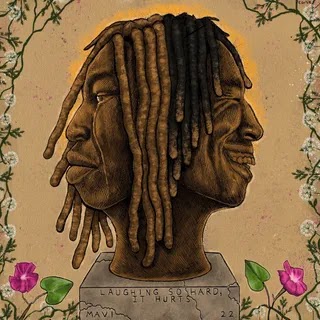Intimate by design but expansive in scope, the rapper’s latest project is an inventive and unnerving evolution of his singular style.
Mavi was expecting to follow his acclaimed 2019 debut, Let the Sun Talk, with a record called Shango, which the 23-year-old rapper has taken to calling “a very manly, muscular album” and which was eventually shelved. In its place came first the slightly tortured EP End of the Earth, released early last year, and now the gently probing Laughing so Hard, it Hurts, a record whose raw nerve endings sizzle and pop to make even its weariest verses seem animated by a desire for contentment, for harmony. It’s intimate by design, with Mavi’s frequently muted voice drawing the listener’s ear close to the speaker, but expansive in scope: Its opening song is named for a folk hero from American slavery, and its closing one traces the running routes through his native Charlotte, North Carolina that are “carved into the small of [his] back.” Languid in spots, but never for too long—its 16 songs last just over 38 minutes—Laughing so Hard suggests a zen state that is being punctured then resealed in endless loop.
It would be tempting to collapse Mavi’s style into the Earl Sweatshirt/MIKE scene that has been so popular and so prolific over the last five years. And while he shares plenty of qualities with those rappers—he has in the past affected voices similar to both pre- and post-Some Rap Songs Earl, and his taste in production skews toward the jagged and seemingly unfinished—Laughing so Hard features a staggering number of vocal styles and melodic ideas. That aforementioned hush, heard especially on songs like “Doves,” invites tantalizingly ambiguous readings, sounding at times like a seduction and at others like an embarrassed confession. He’s desperate on the tender “My Good Ghosts” and guarded despite the exuberant beat on “Opportunity Kids”; elsewhere, on “Spoiled Brat,” the way Mavi allows the last line of each phrase to unspool into song turns simple detail (“I’m glad I washed my hands”) into maxim.
Dylvinci and Wulf Morpheus combine to furnish roughly half the album’s beats, with contributions from monte booker, Jacob Rochester, and longtime collaborator ovrkast, among others. As with Mavi’s voice, the music is thick with invention. Let the Sun Talk was originally uploaded to SoundCloud as a single, 32-minute track; while the palette here is brighter and slightly more polished, Laughing so Hard retains the feel of different musical directions overlapping and enjambing. This is not precisely the muddy, self-consciously lo-fi production spilling out of New York’s underground, nor the ostentatiously technical post-post-post-Dilla chops that dominate other corners, but a welcome hybrid of the two where lushness and brittleness converge in beats, like Rochester’s “The Inconvenient Truth,” that are at once rugged and delicate. Mavi, who wrote the majority of the album to melodic demos without any drums programmed over them, navigates those rhythms with a dexterity that is never foregrounded, but stunning on inspection.
Like the rappers to whom he’s most most frequently compared, Mavi’s writing is often characterized as cryptic or enigmatic. And while his verses do include some little parabolic bursts, he is most effective when he’s being direct, as on the harrowing “Chinese Finger Trap,” when he says he’s “finally sober—and it’s just another layer of lonely,” or when he laments, on “Hemlock,” “I see when niggas get famous, the revolution in them die.” The latter line gives way to one of Mavi’s best modes, a rigorously economical tangle with spiritual struggle:
They gnaw my flesh
Mispronounce my name
Deny my breath
Snap my bones in two
Memorize my screams
Then memorize they steps
There are more lighthearted applications of his straightforward approach, like when he quips that money is getting “mildewy, like white people dreads,” or when he raps that a girlfriend “know she can get a Chanel whenever my streaming hit.” Twenty years ago, that line appearing on a nominally underground rap record would have seemed like a radical blurring of hip-hop’s different spheres—it’s essentially the core conflict of The College Dropout. When Mavi says it today, it’s instead unnerving for the way it literalizes the more symbolic parts of his music, the gnawing at his flesh monetized and tracked down to the thousandth of a cent. But Laughing so Hard does not take a defeated or cynical view of that economic exchange. It sees that slow accrual as one more line on a ledger of incremental progress toward a world that is slightly more forgiving.



0 comments:
Post a Comment